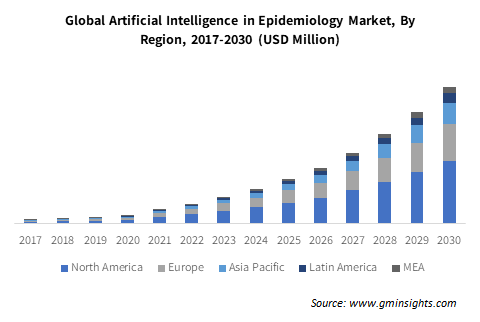Home > Healthcare > Healthcare IT > Artificial Intelligence > AI in Epidemiology Market
AI in Epidemiology Market Analysis
- Report ID: GMI5364
- Published Date: Sep 2022
- Report Format: PDF
AI in Epidemiology Market Analysis
Based on the mode of deployment, the artificial intelligence in epidemiology market is bifurcated into web-based and cloud-based segments. The web-based segment is poised to depict a CAGR of more than 26% through 2022-2030. The adoption of web-based software in epidemiology offers numerous benefits, including the ability to merge with other platforms that are interoperable. Web-based resources are also developed to provide health information quickly and support decision-making. Developments such as these will escalate the use of AI in web-based epidemiological data analysis.
In terms of applications, the AI in epidemiology market value from the disease & syndromic surveillance segment is anticipated to reach USD 1.8 billion by 2030. There is an increasing focus on monitoring and management of infectious and chronic diseases. Moreover, availability and high access to patient data are some of the benefits of AI across the application.

Based on end-users, the artificial intelligence in epidemiology market is categorized into healthcare providers, pharmaceutical and biotechnology companies, research labs, and government & state agencies. The research labs segment accounted for over 29% business share in 2021 and will be valued at over USD 935 million by 2030. An increase in the number of grants-in-aid and other support from governments has been observed, to carry out research studies and identify the knowledge gaps in the healthcare sector. Research labs are also using AI technology to conduct epidemiology studies and advance disease detection & prognosis.

North America artificial intelligence in epidemiology market is slated to exhibit a CAGR of 26.5% through 2030. The region has witnessed an escalating usage of AI solutions by federal agencies. The robust presence of major tech players, including Alphabet, IBM, Cerner Corporation, and Microsoft Corporation, will also foster efficient integration of AI in epidemiology. Countries like the U.S. and Canada boast of major pharmaceutical and biotechnology companies which investment significant amounts in research, representing strong potential for AI solution providers in North America.

